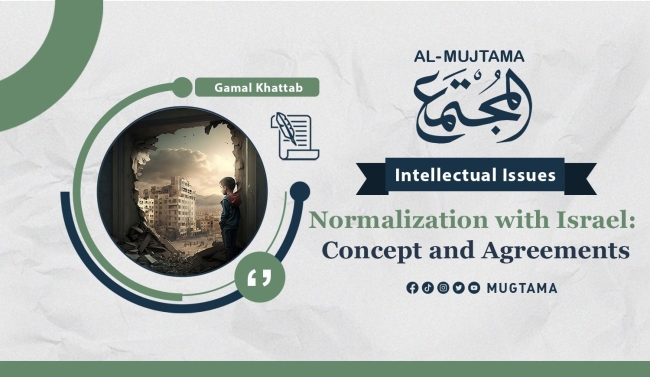Normalization with Israel: Concept and Agreements Featured
The Meaning of Normalization
The term "normalization” started back in 1979 when Egypt signed the Camp David Peace Accords with Israel. This agreement aimed to establish normal and peaceful relations between the two countries, Egypt and Israel, just like how countries usually interact during peacetime.
The word "normalization" didn't have a political meaning before that. It wasn't even mentioned in Arabic dictionaries! Instead, words like temperament, nature, imprinting, and impression were used to describe the concept. These words focused on the idea that a person's character is formed from birth and becomes a part of who they are. This is quite different from the concept of normalization, which aims to make relations between two parties normal and peaceful, even if their current situation is not.
What the Experts Say
The philosopher Michel Foucault was one of the first to talk about normalization. In his book "Control and Punish" and in a lecture called "Security, Territory, Population," he explained that normalization is about creating an ideal model that everyone should follow. It's like having a standard that people, movements, and procedures should conform to. Anything that deviates from this standard is seen as unnatural and unacceptable.
Normalization is also used in fields like medical sociology, healthcare, and science and technology studies. It helps us understand how new ideas and ways of doing things become a part of our daily lives.
Different Forms of Normalization
Normalization can take many forms. Besides political, diplomatic, security, military, economic, and commercial normalization, Israel also focuses on cultural, artistic, and sports normalization. They organize conferences, forums, and events to promote cultural exchange and build relationships with Arab intellectuals and artists.
Israel also uses media and religious normalization. They invite people to Arab TV channels and organize trips to Jerusalem under the guise of religious pilgrimage. These tactics help create a psychological environment that accepts the idea of displacing Palestinians from their land.
Normalization Agreements with Israel
Over the years, several agreements have been made between Arab countries and Israel to establish normalized relations. Here are some of the most prominent ones:
- Camp David Accords (1978)
This agreement was signed between Egypt and Israel. It outlined a framework for peace, including Israel's withdrawal from the Egyptian Sinai Peninsula and the establishment of an interim Palestinian government in the West Bank and Gaza Strip.
- Israeli-Egyptian Peace Treaty (1979)
This was the first peace treaty between Israel and an Arab country. It faced opposition from other Arab nations, leading to Egypt's isolation within the Arab League.
- Oslo Accords (1993)
The Palestine Liberation Organization (PLO) signed these accords with Israel. They aimed to establish self-rule for Palestinians and create a transitional period for the West Bank and Gaza Strip.
- Israel–Jordan Wadi Araba peace treaty (1994)
The Israel–Jordan peace treaty, sometimes referred to as the Wadi Araba Treaty, is an agreement that ended the state of war that has existed between the two countries since the 1948 Arab Israeli War and established mutual diplomatic relations.
- Peace Plan Proposed by Saudi Arabia (2002)
Saudi Arabia presented a peace plan approved by the Arab League. It called for Israel's withdrawal from occupied territories and the establishment of a Palestinian state in exchange for normalizing relations with Arab countries.
- Recent Agreements
In 2020, the United Arab Emirates, Bahrain, Sudan, and Morocco all announced agreements to normalize relations with Israel. These agreements involved various aspects, such as diplomatic relations, economic cooperation, and the recognition of certain territorial claims.
Despite these agreements, and due to repeated Israeli aggressions and violations, most people in the Arab world reject normalization with Israel. Anti-normalization bodies and associations have been formed in several Arab countries, warning of the potential dangers to Arab and Islamic societies.


